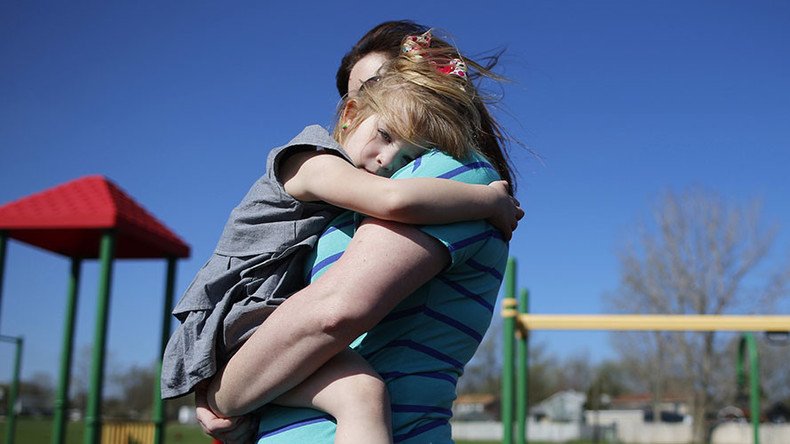Over 5 million American children have a parent in jail – report

A new report examining the devastating toll of incarcerated parents on children, families and their community has found that over five million children have a parent in jail, leading to poor education outcomes, economic strife and psychological problems.
“The saying is all too familiar: Do the crime, do the time. But in America’s age of mass incarceration, millions of children are suffering the consequences of their parents’ sentences and our nation’s tough-on-crime practices,” stated the report, A Shared Sentencereleased on Monday by The Annie E. Casey Foundation.
An estimated five million children in the U.S. have had a parent serving jail time; something the Annie E. Casey... https://t.co/a0tF1NVBHp
— Kasey Chronis (@KChronisWNDU) April 25, 2016
Over a period of four decades, the report found that the number of children with a father in prison or jail at some point in their childhood rose by 500 percent. The sharp increase came along with the emergence of laws and policies mandating long sentences for drug possession as well as three-strikes laws and incarcerations for low-level crimes.
For the children, most younger than 10, these circumstances created great instability. When fathers are incarcerated, family income can drop by an average of 22 percent, the report found. Many of the families already relying on public programs such as food stamps struggled with the loss of income and became more dependent.
“Mothers…report being unable to pay for necessities such as food, utilities, rent and medical care for their children,” stated the report.
RT_com: RT RT_America: Poverty hinders IQ in the US more than other Western countries – study
— Anonymous (@CovertAnonymous) December 23, 2015
… pic.twitter.com/3syVuC2OXD
A recent survey found that 65 percent of families with a member in jail could not meet basic needs, and “thousands of dollars in court-related fines and fees, along with costly visits to maintain contact with loved ones, landed nearly one in debt,” the report said.
The findings also noticed that children with an incarcerated parent moved more frequently than their peers, and African-American children in particular were at greater risks of homelessness.
“Housing instability disrupts connections with family, friends, schools and other support networks,” stated the report.
The report found the percentage of children with incarcerated parents varied between states from a low of 3 percent in New Jersey to a high of 13 percent in Kentucky. Of the 5 million children with an incarcerated parent, 503,000 were in California, 477,000 in Texas, 312,000 in Florida.
Stop eroding faith in gov’t: DOJ warns courts about fining & jailing poor people https://t.co/V5K43Xutmmpic.twitter.com/6dD9NGFztE
— RT America (@RT_America) March 14, 2016
Researchers found that about 45 percent of men aged 24 or younger in federal and state prisons were fathers. For the same age group, about 48 percent of women in federal prison and 55 percent in state facilities were mothers.
There are 2.2 million people incarcerated in the US, and 91 percent of them are adults, according to The Sentencing Project. Of those, 60 percent are minority men, 858,000 black and 464,000 Latino. They are mostly under 40 and poorly educated.
Another consideration is the staggering costs of annual corrections borne by taxpayers and the state to the detriment of other public programs. The Cap Times estimated annual corrections in Wisconsin costs $1.5 billion.
“There is no question that our country’s practice of mass incarceration is flawed, costly and in need of change. Policymakers on both sides of the aisle have pushed for better solutions, and several states have overhauled their correction systems,” stated the report. “[But] the policy debates about incarceration rarely focus on the burden borne by children and their families.”
Life expectancy gap between rich and poor is growing – study https://t.co/CTD0qLJxfFpic.twitter.com/XZWDCjaaXB
— RT America (@RT_America) February 22, 2016
Among the foundation’s recommendations is to address the traumatic effects on children of having an incarcerated parent and making mental health and counseling programs available to caregivers and children. Another proposal is preserving the relationship between the child and the imprisoned parent shown to reduce a child’s anxiety, and to lower recidivism rates in offenders. A third recommendation is to direct judges to consider the impact on a child when sentencing a parent.
The report also advocates that schools offer programs to focus on children’s mental and emotional well-being and for states to give caregivers access to financial support, child care, legal assistance, and health and housing assistance. Furthermore, the report urges incarcerated parents be given access to vocational training, so they can acquire a job on release. Lastly, it supports repealing limits on offenders’ access to public assistance such as food stamps and lifting restrictions on people with criminal records when it comes to applying for jobs.












